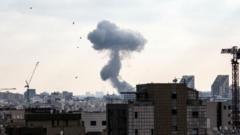President Trump's decision to launch military action against Iran without seeking Congressional approval has led to a divided response from lawmakers and aides, with critics asserting it equates to a declaration of war, while supporters argue it was a necessary step for national security.
U.S. Strikes on Iran: A Controversial Military Action Without Congressional Approval

U.S. Strikes on Iran: A Controversial Military Action Without Congressional Approval
The recent U.S. military strikes against Iran's nuclear facilities, ordered by President Trump without Congressional authorization, have sparked debate about the legality and implications of such actions.
In a significant escalation of tensions, President Trump ordered strikes against Iranian nuclear facilities without consulting Congress, igniting a fierce debate regarding the legality of such actions under the U.S. Constitution, which reserves the power to declare war for the legislative branch. Critics, including numerous lawmakers from both parties, contend that the strikes represent an unauthorized act of war.
Secretary of State Marco Rubio defended the strikes as a "limited action" focused solely on Iran's nuclear capabilities, asserting that it does not constitute a war. Similarly, Vice President JD Vance emphasized Trump's authority to prevent the spread of weapons of mass destruction, suggesting that the military action was warranted.
However, the situation is complicated by statements from Trump himself, who indicated that his ambitions could extend beyond mere defensive measures. Online, Trump hinted at potential regime change in Iran, stating, “If the current Iranian Regime is unable to MAKE IRAN GREAT AGAIN, why wouldn’t there be a Regime change??? MIGA!!!”
The strikes have raised alarms about the risks of retaliation from Iran and the possibility of escalating military conflict in the region. Critics argue that the decision was made too quickly, without allowing adequate time for debate among American policymakers, lawmakers, and the public. This incident has further fueled discussions about the need for Congress to impose stricter limitations on a president's ability to initiate military actions, a concern that has been growing in light of previous military engagements in the Middle East and Central Asia.
As diplomatic relations continue to deteriorate, the implications of this military action on U.S.-Iran relations and the broader Middle Eastern geopolitical landscape remain to be seen.






















